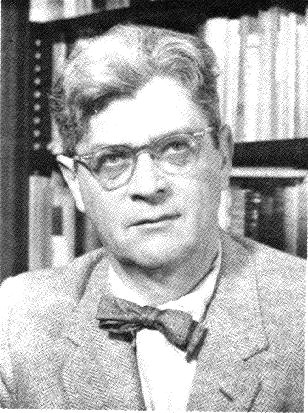| Profile | Major Works | Resources |
Alexander Gerschenkron, 1904-1978.

Harvard economic historian and development theorist.
Born and raised in Odessa, on the Russian Crimean coast, Alexander Gerschenkron and his father escaped on foot to Romania in 1920, finally making their way to Vienna. Gerschenkron completed his education at the University of Vienna, where he was trained in the Austrian School tradition. However, outside the classroom, Gerschenkron fell under the sway of Austro-Marxism. His socialist leanings ensured his unemployment after obtaining his doctorate in 1928. For the next ten years, Gerschenkron worked as a manager in a motorcycle factory, while pursuing his research interests on the side. He taught at the People's University in Vienna from 1928 to 1931, was a research analyst with the Austrian Wholesale Cooperative Society until 1937. Finally, during 1937-8, he worked under Oskar Morgenstern at the Austrian Business Cycle Research Institute.
Upon Hitler's invasion of Austria in 1938, Gerschenkron escaped overland to Switzerland and then, via the good offices of Charles A. Gulick of Berkeley, managed to make his way to America. He worked for a while as a research assistant at Berkeley, moonlighting as a steelworker in a local shipyard. In 1944, Gerschenkron followed Howard S. Ellis to the Federal Reserve Board in Washington DC, where he would soon would take a prominent research position.
In 1948, at Haberler's instigation, Alexander Gerschenkron obtained an appointment at Harvard, where he taught European economic history and Soviet economics. This time he did need to need to get another paying job -- although he still did recreational work as a critic of Russian literature. His early research concentrated on development in Soviet Russia and Eastern Europe. In a celebrated 1947 article, he found the famous "Gerschenkron effect" (i.e. that changing the base year for an index determines the growth rate of the index). His early work (e.g. 1951), often pursued the statistical shenanigans of Soviet planners.
Gerschenkron was also a famous propounder of the "linear stages" theory of economic development, perhaps best demonstrated in his 1962 book. However, he did accept that different periods exhibit different types of development: for instance, with the coexistence of advanced and backward countries, that latter could skip several stages which the former had to go through by adopting their advanced technology. The peculiar paths of industrialization of Meiji Japan and Soviet Russia were regarded as examples of this. There is some advantages, Gerschenkron insisted, in industrializing late.
Gerschenkron is generally regarded as the "father" of quantitative New Economic History. Through his students, he successfully created a "school" of around himself. Gerschenkron had become one of the leading attractions at Harvard of the 1950s and 1960s. He retired from Harvard in 1974.
|
Major Works of Alexander Gerschenkron
|
|
HET
|
|
Resources on Alexander Gerschenkron
|
All rights reserved, Gonšalo L. Fonseca
